Today was the scheduled end of talks but after a 'disappointing' draft text was released by the presidency, we're heading into overtime.
 ADVERTISEMENT
ADVERTISEMENT
Welcome to our live coverage of COP28. Keep up to date with the latest news from Dubai from the UN climate conference.

 ${title}
${title}
Live ended
Everyone is tired, night has fallen in Dubai and it is looking like a new draft text is unlikely to drop any time soon. The best information we have right now is maybe early tomorrow morning.
We're leaving our live coverage here for today but anything could happen overnight as negotiators push through the overtime at COP28. Don't worry, we'll be here in the morning with all the latest updates.
For now, here's what happened today:
- US, EU and small island states are among those pushing for stronger language on fossil fuels after the draft text released yesterday was deemed "insufficient".
- COP28 presidency said it hoped the draft yesterday would reveal countries' "red lines" and "spark conversations". It definitely did that.
- UK climate change minister Graham Stuart returned to London from Dubai much to the dismay of climate campaigners and politicians. He is due to return after a vote in the UK parliament this evening.
- There are signs progress is being made and the COP28 President plans to continue consulting with negotiating groups and parties well into the early hours of tomorrow morning.
COP28 President 'determined' to deliver a text that has support of all parties
We've just received an update from the COP28 presidency on where things stand right now.
"Overnight and throughout today, the COP28 President and his team have been engaging in extensive consultations with a wide representation of negotiating groups and Parties," a spokesperson says.
"This is to ensure that everyone is heard, and all views are considered."
Sultan Al Jaber is "determined" to deliver a version of the text that has the support of all parties. the spokesperson says, and consultations are due to continue well into the early hours of the morning in Dubai.
US climate envoy John Kerry has said that the new draft text we are waiting for has stronger language around fossil fuels.
He was quizzed by journalists as he made his way between meetings, confirming that progress is being made on this key issue.
There hasn't been much else so far of note about this updated version and it's looking unlikely that we'll see a new draft any time soon.
EU climate chief Wopke Hoekstra says he has shared the bloc's position with COP28 president Sultan Al Jaber. Hoekstra adds that this COP should "mark the beginning of the end of fossil fuels".
Our work at #COP28 continues. We discussed the European Union's position with @COP28_UAE president.
We want this COP to mark the beginning of the end of #fossilfuels, and will keep pushing for that, together with our partners in @HACoalition, @AOSISChair and the Umbrella Group. pic.twitter.com/OesdYhU6ip
— Wopke Hoekstra (@WBHoekstra) December 12, 2023
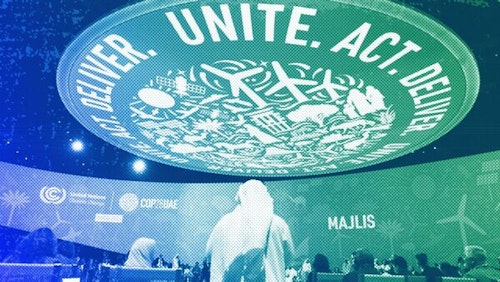
View: COP28 could phase out fossil fuels without us realising
The various milestones agreed so far at COP28 are far from everything we need — but they’ll play a key role in shifting energy markets into a new gear under the realisation that the demise of the age of oil can be accelerated or delayed, but is ultimately unstoppable, Dr Nafeez Ahmed writes.It is getting late in Dubai, the expected deadline of 6pm GST for a new draft has passed and negotiations are officially running over.
So where's the hold-up and what are some of the sticking points negotiators are trying to iron out in the 21 page draft text?
The biggest one and definitely the point that has received the most press coverage is probably language on fossil fuels. Instead of calling for a phase out - unabated or otherwise - the text says to reduce the consumption and production of fossil fuels. Climate-vulnerable nations and high-ambition allies say they won't settle for anything less than a phase-out.
But oil and gas producing nations like Saudi Arabia have pushed back against this tougher wording. Others like the G77+ China group say it also fails to recognise that rich historical emitters should be the first to act.
There has been disagreement over the use of the words 'could include'. Rather than giving strict requirements to cut emissions and fossil fuel use, it provides a loose set of options that counties can choose from among other actions. As some have described it, a kind of 'choose your own adventure' for climate action.
Implementation is another critical issue for developing nations. They want developed countries to honour their legally binding commitments to provide mitigation, adaptation and the means - finance and technology etc. - for this to be implemented. It is why you might see some negotiating blocs objecting to a phase out of fossil fuels or even other measures without these means of implementation in place.
There are whisperings that the COP28 president will try to strike a deal overnight, bringing the UN climate conference to an end with a more ambitious text. Whether that is possible remains to be seen.
It isn't an unusual state of affairs though as every COP since 2004 has overrun.
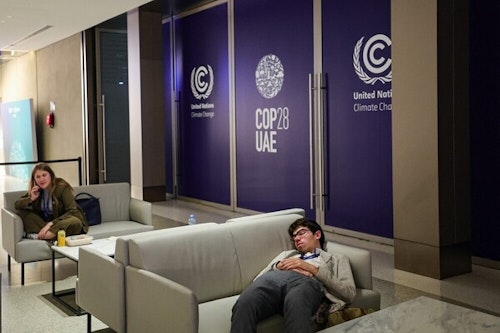
A few photos from a protest against fossil fuels taking place in Dubai this evening.
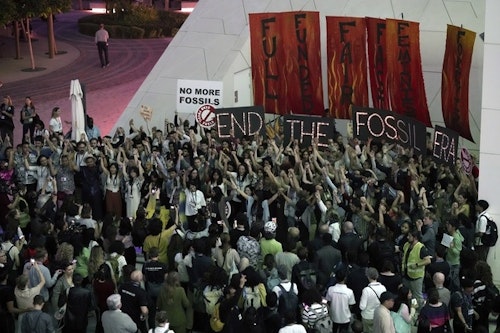

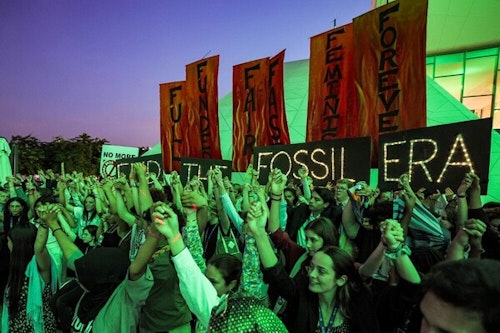
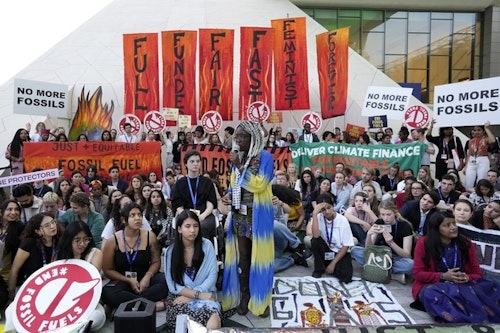
— Jeremy Wilks #climate #science #space #tech #green (@WilksJeremy) December 12, 2023
A spokesperson for UK Prime Minister Rishi Sunak has now said that Minister Graham Stuart flew home to vote in parliament - where lawmakers are weighing up a plan to deport asylum seekers to Rwanda - on Tuesday evening. He will apparently fly back to Dubai after the vote.
Richard Benyon, UK Minister of State for climate, environment and energy, will be holding down the fort while he is gone. He has posted on social media that Britain is at "the heart of the negotiations giving real leadership".
At @COP28_UAE with our wonderful team of 🇬🇧 negotiators at this vital final stage. UK at heart of negotiations giving real leadership pic.twitter.com/trR6CFz6TT
— Richard Benyon (@RichardHRBenyon) December 12, 2023
UK minister has left COP28 at 'critical moment'
There have been reports that the UK minister in charge of COP28 climate talks left Dubai on Tuesday morning raising a few eyebrows at the country's commitment to action.
Graham Stuart, the minister for state for climate change, reportedly left to return to his duties as an MP in London as talks reach crunch point and the conference heads into overtime.
A spokesperson told The Guardian that there will continue to be "full official representation" in Dubai and any final decisions will still be run by Minister Stuart.
The early departure comes after UK Prime Minister Rishi Sunak spent just eight hours in Dubai at the start of the summit. Most other countries are being represented by a minister already more senior than Stuart and his departure leaves negotiations to the civil servants still left at COP28.
And, after the UK said yesterday's draft text was "disappointing" making its position on supporting a phase-out of unabated fossil fuels clear, critics have said the minister's departure leaves their commitment to that position in question.
Green MP Carlone Lucas said on social media site X that the government's "last shred of moral authority" in tackling the climate emergency has been "obliterated" with Stuart walking away from negotiations "at the most critical moment".
"As world leaders are locked in intense negotiations to discuss the existential threat posed by climate disaster, the departure of Minister Stuart is yet a further slap in the face to countries urging major polluters like the UK to act," says Hannah Bond, co-director of policy advocacy and programmes at ActionAid.
"In a shocking betrayal of trust as COP wraps up, the Prime Minister seems happier to fight the culture wars and not climate change"
Once again, Carbon Brief's Simon Evans has the lowdown on the details of the draft text. Earlier today he shared a list of the topics that have been agreed, not agreed or aren't in the text at all.
#COP28 update 1240 GST 12 December
In case you were wondering, no, COP28 has not concluded at 1100, as the presidency insisted
Why not? Here's the latest list of topics that are agreed, not agreed and (in some cases) even lacking draft text
Details:https://t.co/NtOc6QPYfw pic.twitter.com/CojrzEUNq7
— Simon Evans (@DrSimEvans) December 12, 2023
What is the fossil fuel Fossil Fuel Non-Proliferation Treaty?
While we wait for news on a text held up by disagreements on fossil fuels, let's take a look at a growing bloc of countries pushing for an even more ambitious end to oil and gas.
Led by Pacific Island Nations, this group is seeking a negotiating mandate for a Fossil Fuel Non-Proliferation Treaty. That means a treaty to stop fossil fuel exploration and expansion and a phase-out of existing production that aligns with Paris Agreement targets and supports a just transition to renewable energy.
The idea is a similar international mechanism of the treaty on the non-proliferation of nuclear weapons that came into force more than five decades ago.
It has been backed by the Vatican, the World Health Organisation, the European Parliament and a growing number of nations. Nauru, a tiny island country northeast of Australia, became the 12th nation to formally call for such a treaty on Monday.
"We are ready to do our part in making the Pacific a fossil fuel-free zone. In this regard, Nauru would like to use this opportunity to join others in calling for a treaty to phase out fossil fuel production,” said Mr Reagan Moses, Secretary for Climate Change and National Resilience of Nauru.
The country is vulnerable to the impacts of rising sea levels, strong winds, ocean acidification and the effects of coral bleaching. Moses said that without the island's marine port, its people would be almost entirely cut off from food, medicine and almost all other necessities. This isn't a hypothetical either, with storms today cutting off shipments for a number of weeks.
Palau, Colombia and Somoa have also backed calls for a Fossil Fuel Non-Proliferation treaty at COP28 as the number of countries joining this bloc. Other members include Vanuatu, Tuvalu, Tonga, Fiji, Niue, the Solomon Islands, Antigua and Barbuda and Timor-Leste.
Alex Rafalowicz, executive director of the Fossil Fuel Non-Proliferation Treaty, has said the current text is a "maze of dangerous distractions made to confuse us".
"It’s taken decades for the UNFCCC to even mention fossil fuels, and yet we continue to see weak language as well as unproven technologies pushed significantly through the text."
Rafalowicz says we need to move quicker, addressing the root cause of the climate crisis.
"We’ve seen political will from countries like Colombia and Island States in the Pacific and the Caribbean to do so."
EU climate chief says 'super majority' want more ambition
EU climate commissioner Wopke Hoekstra and other members of the High Ambition Coalition (HAC) - an alliance of the world’s most climate ambitious nations - have met with UN Secretary General Antonio Guterres this morning to share their views.
"There is a very large group of countries here, a majority, a super majority some call it here, that do want more ambition, on mitigation, on adaptation, on financing, on solving the problem and making sure that we keep 1.5 in reach," he told reporters after coming out of this meeting.
He added that the HAC needed to come together to make that happen.
"That's what we owe to each other and that's what we owe to everyone watching around the world."
Hoekstra posted a full recording of the press huddle on X, formerly known as Twitter.
1/3 There's a strong group of countries fighting at #COP28 to keep alive the 1.5c limit in the Paris Agreement - not just in words but with a clear pathway to deliver. With our friends in the @HACoalition we met @antonioguterres to present our views. We'll keep working together. pic.twitter.com/uk0iFRsgLg
— Wopke Hoekstra (@WBHoekstra) December 12, 2023
2/3 There's a strong group of countries fighting at #COP28 to keep alive the 1.5c limit in the Paris Agreement - not just in words but with a clear pathway to deliver. With our friends in the @HACoalition we met @antonioguterres to present our views. We'll keep working together. pic.twitter.com/YeQaLT4rgj
— Wopke Hoekstra (@WBHoekstra) December 12, 2023
3/3 There's a strong group of countries fighting at #COP28 to keep alive the 1.5c limit in the Paris Agreement - not just in words but with a clear pathway to deliver. With our friends in the @HACoalition we met @antonioguterres to present our views. We'll keep working together. pic.twitter.com/CPm25qoBEK
— Wopke Hoekstra (@WBHoekstra) December 12, 2023
A reminder from Euronews science reporter Jeremy Wilks as the COP28 process continues.
Global GHG emissions increased 1.2 percent from 2021 to 2022, to reach a new record high of 57.4 giga tonnes of CO2 equivalent. They rose again by 1.1% in 2023.
— Jeremy Wilks #climate #science #space #tech #green (@WilksJeremy) December 12, 2023
This global stocktake will inform the next round of Nationally Determined Contributions from countries, due in 2025
This will include targets for 2035. If we want to be below 2 degrees we need global emissions in 2035 to be down to 36 GtCO2e. And down to 25 gt to reach 1.5C
— Jeremy Wilks #climate #science #space #tech #green (@WilksJeremy) December 12, 2023

2,000 new species have been added to the IUCN's endangered list
Frogs, salmon and turtles are among the 44,000 species now threatened with extinction with around 2,000 added to the list in 2023 alone. Additions to the list were announced by the IUCN at COP28 on Monday.
At COP28, 12,000 surveillance cameras are causing concerns about civil liberties
The United Arab Emirates has one of the highest concentrations of surveillance cameras on Earth. Some of those at COP28 are linked to an Emirati group accused of spying.We wanted the draft text to 'spark conversations', COP28 presidency says
COP28 Director-General Ambassador Majid Al Suwaidi has given reporters in Dubai an update on where negotiations stand.
"Many issues remain open, and that is normal at this stage of things," he said.
"As you know, yesterday we released a text. As you also know, lots of Parties felt it did not fully address their concerns. We expected that. In fact, we wanted the text to spark conversations…and that is what happened."
Al Suwaidi says that parties hold deeply split views - especially on the language of fossil fuels. He again reiterated that the text was released as a starting point for discussions.
"When we released it, we knew opinions were polarized…but what we did not know was where each country’s red lines were.
"By releasing our first draft of the text, we got Parties to come to us quickly with those red lines."
The director-general said that the presidency spent last night taking that feedback which has put them in a position to draft a new text - one they hope will include a "historic" mention of fossil fuels. But, he says, it is then up to the parties to agree on it.
"Now we need them to roll up their sleeves and give us a text we can all be proud of."
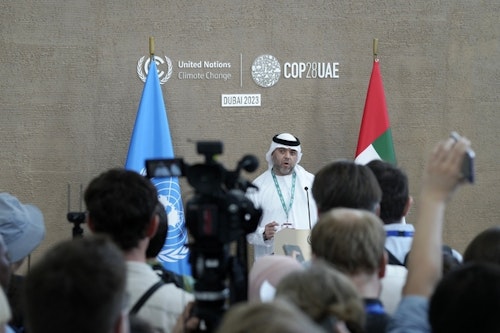
Hopes for finishing on time have faded fast - COP28 was meant to finish around midday local time today. But it isn't unusual for the climate talks to run over with plenty of previous conferences taking a few days longer to conclude than planned.
So what's holding up the deal? The draft text released by the presidency yesterday wasn't received well by many countries. In part because of paragraph 39 which covers fossil fuels and energy. It calls for countries to reduce “consumption and production of fossil fuels, in a just, orderly and equitable manner" rather than an outright phase-out.
There's been a lot of discussion over the little word "could" included before the list of recommendations too. Critics have said it provides countries with a loophole that means these are paths they could take, inter alia (among other things). So far I've heard the draft called a "choose your own adventure" approach to climate action and a "meaningless wishlist".
And all of this is just about the portion of the text covering energy and fossil fuels. There's still work to be done on climate adaptation, technical issues such as the regulation of carbon markets and more concrete goals in some other parts of the text.
Needless to say, there's still a long way to go before we will have a final deal from COP28.
Good morning! We're here once again on what is meant to be the final day of COP28 - though that is looking increasingly unlikely.
Here's a recap of what happened yesterday:
- COP28 presidency released a long-anticipated draft text that doesn't include the phrase 'phase out' fossil fuels - much to the disappointment of various countries and campaigners.
- EU Climate Commissioner Wopke Hoekstra said that as it stands now, it is "disappointing" and "not adequate to address the problem we are here to tackle".
- Many NGOs, campaigners and civil society groups have also said that it is inadequate.
- Small Island States are concerned that their voices aren't being heard in talks, claiming "several other Parties have enjoyed preferential treatment, compromising the transparency and inclusivity of the process".
- Brazil was formally chosen as the host of COP30 and Azerbaijan was also confirmed as the host of COP29 next year.
Another day, another text! As we head into overtime, expect more wrangling over language, disagreements over fossil fuels and hammering out of the details for the final deal from COP28.










